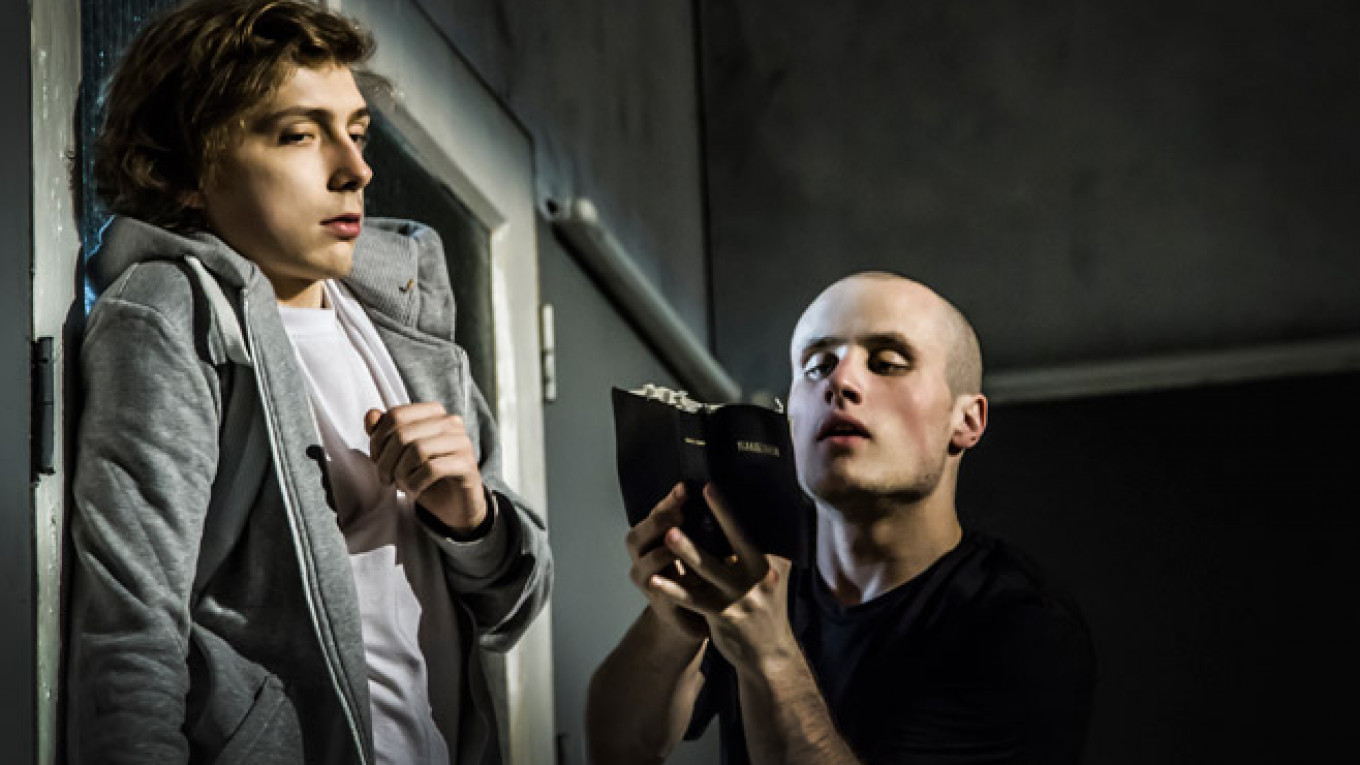It sounds more like a play that would suit the United States these days, with its story of radical, fundamentalist Christianity pulling a school apart. But in Kirill Serebrennikov's staging for the Gogol Center, Marius von Mayenburg's "Martyr" is transformed into a tale for Russia today.
I will eventually spill the beans about an important image that Serebrennikov employs in the final moments of his production. It's a spoiler of sorts, so I'll hold off now. But I mention it because everything in this show leads to that final moment. That's where the director's statement comes; it's a powerful, even cocky statement that puts everything into a Russian focus.
"Martyr" observes the people surrounding the young Veniamin (played with creepy brilliance by Nikita Kukushkin) who has discovered the Lord Jesus Christ and wishes to live only by the tenets of the Bible. Whether he is belligerent about it or whether he is merely true to his own beliefs depends on one's point of view.
Veniamin's mother (Yulia Aug) is annoyed by the changes affecting her son. His teachers and school administrators take varying positions of tolerance as they work with the increasingly anti-social boy. Veniamin's friend Grigory (Alexander Gorchilin), a boy with a limp who is shunned by others, becomes something of a disciple, without buying into Veniamin's beliefs.
Lidia (Alexandra Revenko), who repeatedly flirts with Veniamin, doesn't understand why the usual moves don't work on him — although she doesn't care much either. It's just that between these two the usual rules of the sex game don't hold true.
Veniamin's insistence that others live by his rules — and his inability to live by any rules but his own — set the stage for continual confrontations.
He demands that Lidia wear a one-piece swim suit in physical education classes. During a comical sex education segment in his biology class, he refuses to handle a carrot and a condom and threatens to strip in order to use the condom as it is intended. He attempts to heal Grigory's leg by faith and becomes abusive when he fails.
The confrontations grow dangerous as Veniamin declares to his biology teacher, Yelena, that God dislikes Jews, while he and Grigory discuss ways to kill Yelena, whom he suspects of being Jewish.
The play depicts a slow slide into a nightmarish crisis that is handled badly and without understanding by virtually everyone but Yelena (played with intelligence and resilience by Viktoria Isakova). She repeatedly attempts to appeal to Veniamin's conscience and to the common sense of the school faculty, invariably failing. When the boy accuses her of touching him, all hell breaks loose and she, to her horror, becomes the primary object of suspicion, hatred and condemnation.
Serebrennikov in "Martyr" explores the consequences of zealotry, and of what happens when lies and ignorance are thrown into the equation. What begins as a young man's troubling behavior balloons into a much bigger conflagration fanned by adults incapable of dealing with the crisis he provokes.
If you don't appreciate issue plays — that is, plays that hammer home strong social and moral messages — "Martyr" may come across as simplistic and obvious.
But — and here comes that spoiler — when Yelena realizes that the whole town has turned against her and wants to drive her out, she nails her shoes to the floor and declares: "I am not leaving!"
This is the moment when Von Mayenburg's story crosses lines with life in Russia today. At a time when educated Russians increasingly discuss the option of emigrating to avoid what they see as a public discourse poisoned by lies and zealotry, Serebrennikov says through his art: "I'm going nowhere no matter how difficult the conversation gets. I'm staying to do my job."
It's a message he and his cast bring home with clarity and power.
Note: The Gogol Center soon closes until spring for renovations. Most shows in the theater's repertoire will not be performed in the near future. "Martyr" will occasionally run at the Meyerhold Center.
"Martyr" (Muchenik), a production of the Gogol Center, plays Oct. 28 and Nov. 30 at 8 p.m. at the Meyerhold Center, located at 23 Novoslobodskaya Ulitsa. Metro Mendeleyevskaya. Tel. 495-363-1048. Running time: 2 hours, 40 minutes.
Contact the author at artsreporter@imedia.ru
A Message from The Moscow Times:
Dear readers,
We are facing unprecedented challenges. Russia's Prosecutor General's Office has designated The Moscow Times as an "undesirable" organization, criminalizing our work and putting our staff at risk of prosecution. This follows our earlier unjust labeling as a "foreign agent."
These actions are direct attempts to silence independent journalism in Russia. The authorities claim our work "discredits the decisions of the Russian leadership." We see things differently: we strive to provide accurate, unbiased reporting on Russia.
We, the journalists of The Moscow Times, refuse to be silenced. But to continue our work, we need your help.
Your support, no matter how small, makes a world of difference. If you can, please support us monthly starting from just $2. It's quick to set up, and every contribution makes a significant impact.
By supporting The Moscow Times, you're defending open, independent journalism in the face of repression. Thank you for standing with us.
Remind me later.







